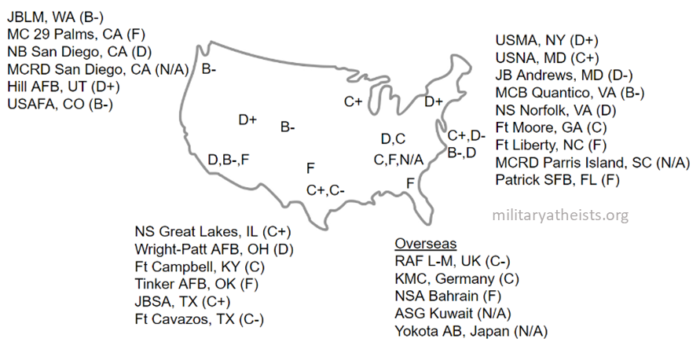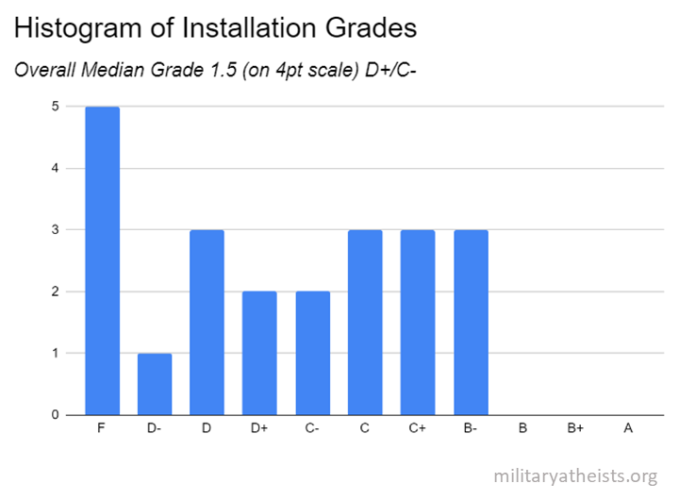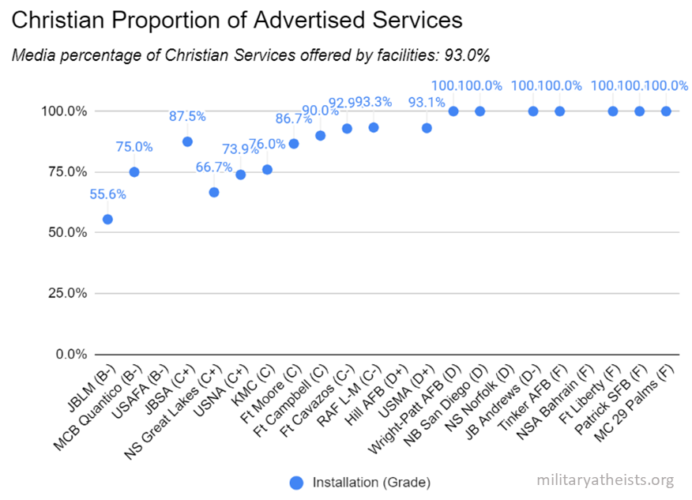Installation Chaplain Services Disregard Needs of Nontheists
The Military Association of Atheists & Freethinkers (MAAF) surveyed 26 installation chaplaincy activities, around the world, in all branches. Four (4) installations were excluded due to lack of publicized services. Among these facilities, MAAF found advertised 342 weekly services. Of those weekly services, 304 (88.9%) were Christian. And among those installations, the median percentage of weekly Christian services was 93.0%. It is unclear how a chaplaincy committed to diversity could advertise almost exclusively Christian services.
The Median grade earned was 1.5, between D+ and C-. This score reflected the strong bias toward Christian services to the exclusion of non-Christian services. Five (5) installations, over 22% of those graded earned an F grade due to having not only exclusively Christian services but additional negative mitigating factors. The highest grades were B-, earned by 3 installations with a number of diversity programs. None earned higher grades because the bias was always to Christianity and none mentioned humanist or other nontheist programs.
There were several highlights: The US Air Force Academy has the SPIRE program focusing on diversity for cadets. This program has the serious flaw of excluding nontheists but is otherwise a positive model for diversity. Joint Base Lewis-McChord services were almost 50-50 Christian versus non-Christian services. Though it may happen that the majority of attendees go to Christian services, the count of services themselves being closer to 50-50 makes sense since there are many non-Christian beliefs to serve on the installation. Navy Recruit Command featured “self-directed time” which is a concession to nontheists but falls short because it does not re-establish a successful nontheist service that existed there for several years with 60 or more attendees weekly.
View Full 74-page PDF Report with Additional Analysis and Screenshots



(additional notes excerpted from full PDF)
If these public presences speak almost exclusively to Christianity, why should a non-Christian trust a chaplain; why should military leaders trust non-Christians with chaplains? Surely saying ‘we support diversity’ without actual advertised is not enough for chaplains to be trusted with service members. Find your activities in the list below and see how that matches what you see in practice. Don’t see your installation? Contact MAAF to have it considered for the next round. See your installation and want to improve your score? Contact MAAF for materials and assistance in how to improve your public outreach to nontheists and other underserved communities.
MAAF would expect from the chaplaincy services a regular diversity outreach program, at the least, to reach those underserved communities. And, over time, one would expect several communities to come together to build, with chaplain support, regular weekly meetings for specific faith and belief traditions, outside the more common weekly Christian services. There are non-Christians among the population. If the chaplains aren’t serving them, it is for the chaplains, the commissioned, paid professionals, not that underserved population of lay persons to remedy the situation.
Assessment Note: MAAF has assigned simple letter grades for easy review. These are subjective but should be justified based on the review conducted and evidence provided. A indicates a successful effort by the chaplaincy to serve all, resulting in a number of diverse programs. B indicates effort by the chaplaincy to serve all with limited but active diversity programs. C indicates an apparent intention by the chaplaincy to serve all but no clear success in reaching the diverse community with active programs. D indicates limited effort or only lip-service to diversity and a focus on one belief over others. F indicates promotion of one belief over others with no apparent concern for diversity. Note that a standard ‘Sunday services’ Christian chaplaincy will earn a D while an F implies exclusive Christianity plus active promotion. Grades are translated to a 0-4 point scale for statistical aggregation.
